
|
|
Building Freestyle
A Jim Young Designed Y770
by Lawrence Happ
Lake Macquarie N.S.W. Australia |
|
The plans were purchased from Jim Young Marine Ltd. In New Zealand in early 1989
The only changes made to the design were, the bow was straightened (only because I liked the look better) and a self tacking jib fitted for ease of cruising short handed with the family, this turned out to be a great asset racing also.)
West System Epoxy Resin was used for all glassing, fairing, bog and glue
The frames were laid out and made with the help of the head Shipwright Teacher at Newcastle Technical Collage, Ron Stewart.
| I Tow the boat with a Nissan Patrol Short Wheel Base, the boat and trailer weighed approx. 2000kg {2 tonne} we have gone metric in Australia |
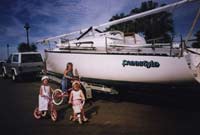
|
|
APRIL 1989
The frames were set up on the levelled strongback in a shed in my back yard, the shed was too short for the boat so a temporary annex had to be built at the front. Western red cedar planks were purchased from a local timber yard, thicknessed to size (45x12 mm.) the planks were scarfed and joined to approx. 8m lengths. I would make up 8 planks a day and fit them to the temporary frames after work, then make up 8 planks for the next day, and so on, until the hull was completed.
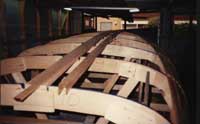 |
Alignment of frames on strongback - 19 April 1989
(click images for larger views) |
|
| First planks (45X12mm western red cedar) |
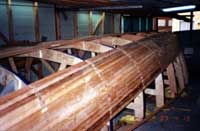
|
|
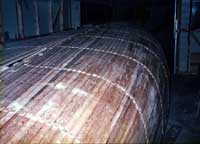 |
Last planks
|
|
The hull was then roughly faired with hand planes. My mate Glenn (a carpenter) and I took two days planing, and then it was faired for glassing with “torture boards” a well named tool. One coat of epoxy resin was applied to seal the hull, the night before glassing.
| Faired and epoxied |
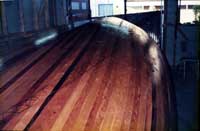
|
|
Plenty of good friends were used to glass the hull in one day. Peelply was used to lessen the need for too much fairing bog. Over the next few weeks the hull was faired, sealed then painted.
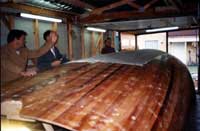 |
Laying out cloth dry
(L to Rt. Ron, Self, John)
|
|
| Ditto from stern (Glenn, Stuart, John) |
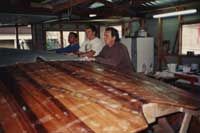
|
|
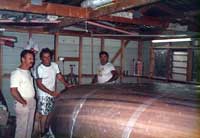 |
Glassed(Glenn, John, Ron)
|
|
6 men carried the hull out of the shed and rolled it over on the grass. Then carried it back into the shed and set it up level with the waterline, on cradles. The hull was stabilised with timber to the sides of the shed and roof trusses so it wouldn’t move as the frames were taken out, one at a time, to glass the inside of the hull.
| Rolled over (6 bodies carried it out & rolled it) |
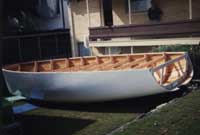
|
|
Bulkheads and bunk frames were next glassed in, the galley cupboards, centreboard case, and then the deck, which was 9mm construction ply. Inside deck joints were glassed and the complete deck was glassed, faired then painted.
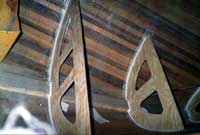 |
bulkheads under V berth
|
|
| Deck beams - foredeck |
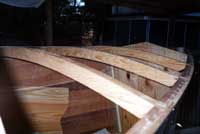
|
|
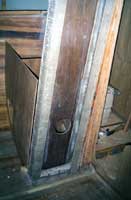 |
Centreboard case starboard side
|
|
| Galley cupboards |
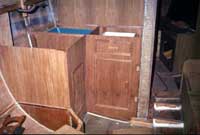
|
|
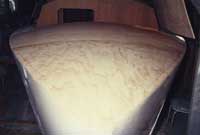 |
Foredeck
|
|
| Painted, port bow |
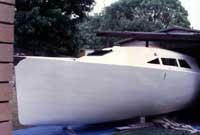
|
|
The centreboard and rudder were both made by first making jigs and then using a large router to shape the blanks to size, faired. Grooves were cut into each side of the centreboard from top to bottom and ½” stainless rod, threaded at the ends, epoxied in, and glassed to specifications and painted.(thus the lifting bracket was connected directly via the ½” rod and through the lead wing)
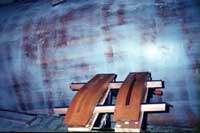 |
Jigs for shaping centreboard and rudder
|
|
| Centreboard 1/2 shaped |
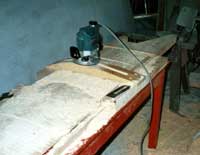
|
|
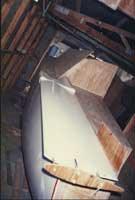 |
Centreboard showing bolts for lead wing
|
|
The 320kg wing was made from a plaster mould that was made by first shaping a foam wing and covering it in plaster reinforced with glass rovings .When dry the mould was cut in half, and the foam plug dug out then stuck back together. The lead was poured and a perfect wing was made.
| Wing |
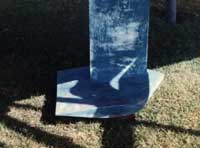
|
|
Lifting the boat over the house was a little stressful because no insurance was obtained to cover either the boat or house for the lift. Not to worry it all went great and the boat was on the ground again. The neighbours had an entertaining morning, watching the lift. The wing was then fitted and the rigging completed.
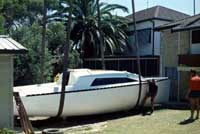 |
Slinging to lift over house
|
|
| Glenn on bow line, Me on sternline |
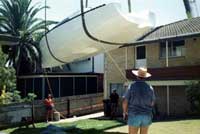
|
|
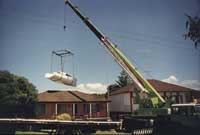 |
Up and over
|
|
| Coming down |
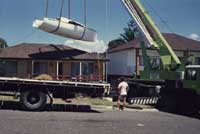
|
|
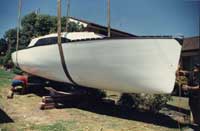 |
Setting up cradles
|
|
| Down safe |
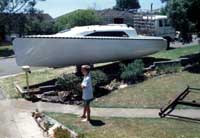
|
|
I hired a car float and the boat was manhandled up and the trailer backed under and tied down. The next morning (very early to avoid the constabulary) it was towed slowly to a boat ramp at Swansea, Lake Macquarie.
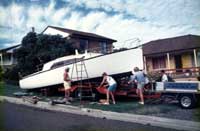 |
Lifting, to back trailer under boat
|
|
| Loading mast and rigging |
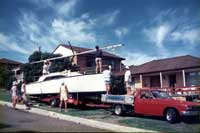
|
|
The launching went well, just sunk the hired car float and floated her off. What a day, January 26th 1991 Australia Day.
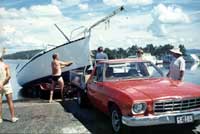 |
The launching
|
|
| She floats perfect on her lines |
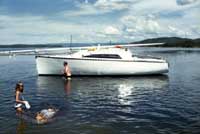
|
|
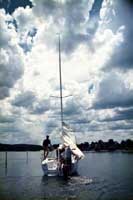 |
First trial, motor and sail 26th Jan.1991
|
|
| Laguna Quays Resort "Boaties weekend" Aug. 1997 |
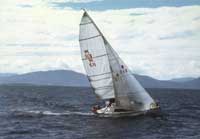
|
|
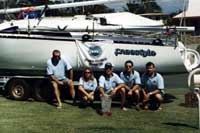 |
Hogsbreath Regatta Winning Crew 1999 (Lin, Nikky, Self, Doug, Grayson)
|
|
| 2 handed race Mackay Qld. crew, Me and Nikky, 1st place) |
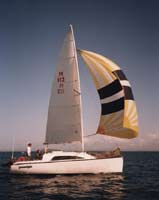
|
|
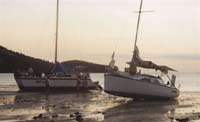 |
On the beach St. Bees Island off Mackay Qld.
|
|
| me on left, receiving 2nd place trophy from President Ray Jones, for Div.2 Australian Trailer Sailer Championships 2002 - held at the Gippsland Lakes in Victoria |
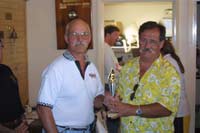
|
|
Owner Builder Lawrie Happ.
LAKE MACQUARIE N.S.W. AUSTRALIA
Note: I can only say it would not have been possible without the help and advice from friends
|

